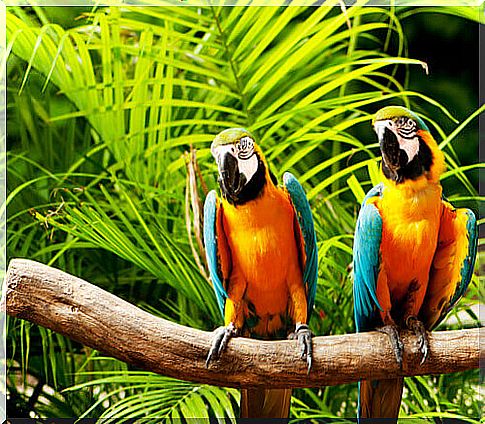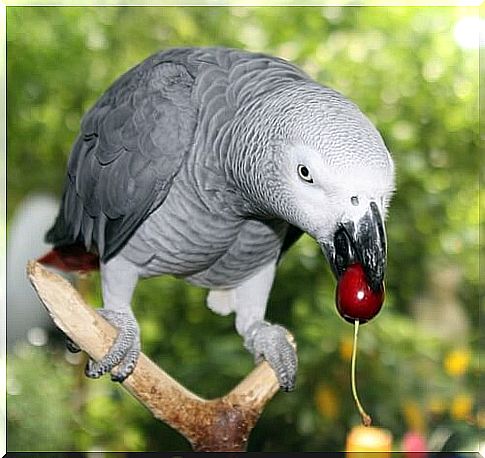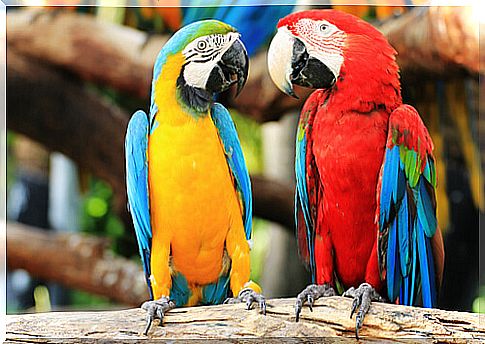Why Do Parrots Talk?

Perhaps the parrot is the pet that comes closest to the expectations that some humans have: that animals speak the same language as they do. But, in reality, what these beautiful birds of the psittaciformes family have is the ability to imitate the human voice. Whether or not they understand what they say remains to be proven.
Looking for answers to why parrots talk

Parrots – like other birds – have a syrinx, a membrane located between the trachea and the bronchi that allows them, with the help of two chambers, to make two sounds simultaneously. Although they lack vocal chords, these sounds can be complex.
Also, they have a long tongue, which is what allows them to emit voices. Through small movements, they can shape the air and differentiate sounds, in a very similar way to man.
Until recently, it was thought that parrots imitated the sounds of their environment and that males had a more extensive repertoire in order to impress females.
However, in an article published in the journal Science, it was revealed that, in fact, these birds are social beings that imitate each other.
Scholars reached this conclusion after observing for 24 years a group of parrots in the Venezuelan jungle.
To explain all this in a more or less simple way: parrots issue contact calls and use them for their social cohesion. It is as if parrots pronounce their own “names” and the “names” of their peers.
Furthermore, the spectrograms of the sounds emitted by these birds showed that they have marks that allow them to identify as members of the same group, something like “identifications” common to all.
It has also been proven that parents use a distinct calling for their offspring and that they learn it when they are between 3 and 4 weeks old.
These calls are used by the parrot to, after certain modifications, build its “own call”. In addition, sound identification allows parents and children to find themselves relatively easily in a large group of birds.
Ornithologist Karl Berg, from Cornell University (United States), tried to demonstrate that these calls are not innate, they are learned.
For this reason, he moved newborn animals from one nest to another and thus observed that the small parrots acquired the “characteristics” of the adoptive parents’ speech.
Everything seems to indicate that the parents provide basic information and that each parrot chick then incorporates modifications to achieve a kind of personal call.
Furthermore, it is thought that the members of a family recognize each other even after leaving the nest.
a parrot at home

If, in a wild environment, parrots learn to communicate with their peers, imitating the sounds they hear, when they are in captivity, they reproduce the sounds emitted by their owners.
That’s why they speak, in the human sense of the word. But let’s not feel exclusive. They also imitate dogs, cats and any other domestic animals. And they will even play with the sounds of the street or the telephone.
It is thought that, in a domestic environment, these birds may use the ability to repeat human sounds as a stimulus-response action.
The animal realizes that, with these imitations, it gets a positive reply that translates mainly into food or attention.
It remains to be seen whether the words they repeat have any meaning for them. No studies seem to have proven it so far.
But beyond these investigations, parrots are very intelligent creatures. Just taking some time to observe them is enough for us to realize the “intellectual coefficient” of these little animals.
And, whether they understand what they say or not, they, in a few years, can learn between 200 and 250 words that they are able to use at the appropriate times. The reason could be that these birds need to be integrated into their new group, to which they believe they belong.
But while the ability to speak like a human makes us very proud, let us always remember that there are other forms of communication that go beyond words.
And that perhaps animals are also hoping that we humans can, from time to time, step off our pedestal and learn their language.









